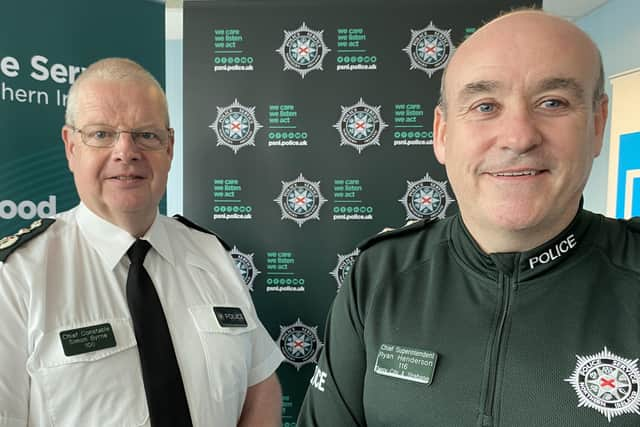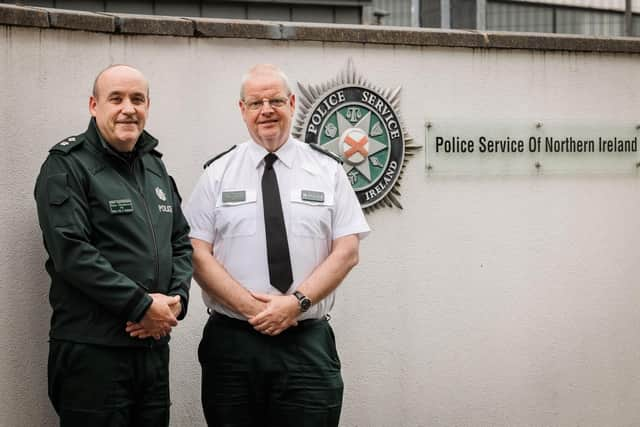Simon Byrne hails PSNI role in reducing offences in Derry visit
and live on Freeview channel 276
The police chief was speaking during a visit to the city where he held a series of engagements yesterday.
The latest security situation report for June 1, 2021 to May 31, 2022, shows the number of shootings in Derry/Strabane fell from 10 to 7 year-on-year, the number of bombings from 3 to 1, the number of paramilitary shooting casualties from 8 to 2 and the number of paramilitary assault casualties from 3 to 0.
Advertisement
Hide AdAdvertisement
Hide AdChief Constable Byrne said he believes a range of actions undertaken by the police have contributed to the reduction.


Chief Constable Byrne said: “Let’s remember this is a small number of people who are still determined to pursue their own ideology by violent means and that particularly being directed towards attacks on the police. So we have continued that push.”
Statistics also show Section 41 of the Terrorism Act 2000, which allows a police constable to arrest someone without a warrant if they ‘reasonably suspect’ a person is a terrorist, was exercised more in Derry than anywhere else. Out of 118 Section 41 arrests in total, 52 were executed in Derry in the past 12 months.
The police chief said the force will continue to ‘disrupt and frustrate that small number of people who still want to pursue that ideology’.
Advertisement
Hide AdAdvertisement
Hide AdDerry/Strabane Area Commander Chief Superintendent Ryan Henderson said the downward trend in security-related incidents was welcome and allowed him and his local policing teams concentrate on ‘normal policing’.


“People in the city don’t want violence and they don’t support violence. The key resource in this city is its young people and everyone I talk to does not want young people getting dragged into being involved with those groups and we in the police are absolutely of the same mind around it.”
Both officers guarded against complacency but C/Supt. Henderson said the apparent reduction in paramilitarism has ‘given us a real opportunity to do very normal policing in this city - the kind of policing people want every day is us being out and about’.
“We have invested in a new fleet. We are much more visible. We are accessible because we have invested in our neighbourhood team and have more neighbourhood officers out now than we had before and that has really helped to strengthen the bond between the communities and the police. I have no doubt that that helps to change the environment.
Advertisement
Hide AdAdvertisement
Hide Ad“People in the city have no tolerance or patience for it either because the city is booming. We have the City Deal, the new medical campus and actually people have real, ‘real-world’ problems that are affecting them - the cost of living crisis and the mental health challenges within the city and that’s the policing we want to be doing.
“Yes, we are very mindful of the terrorist threat but we don’t want it to define us in terms of the PSNI. It is not the policing we want to be doing and that is why we are trying to really push into that space.
“All the signs are good. The national security attacks, the trend in recent years has been lower and lower. We are seeing less of paramilitary-style activity in the city,” said the Derry police commander.
The ‘Journal’ asked both officers to respond to the criticisms that have been levelled at the PSNI’s Tactical Support Group (TSG) and Terrorism Investigation Unit (TIU) after various anti-terror operations in nationalist and republican areas like Creggan.
Advertisement
Hide AdAdvertisement
Hide AdChief Constable Byrne said: “There is a lot of careful planning when we are searching homes - about the time of day, does it involve children and young people...”
The top-ranking police officer in the north claimed lessons had been learned.
“I think we’ve learned over recent times to be far more subtle about when we are doing work and I think that produces some dividends.”
C/Supt. Henderson said: “It’s really important for me as the commander that we’re having the final say. We’ve done a lot of work internally to help colleagues that will come in from time to time to work to shape how it is going to look...that our neighbourhood officers are involved in it and we think through those issues about time of day etcetera.
Advertisement
Hide AdAdvertisement
Hide Ad“Sometimes, because the risk is so high we just have to go and might be doing a search on an evening but those are pretty rare.
“We try and do them at a time when the kids will be out of the house, people can be away at school. You can minimise the impact and we try and get the search done in sufficient time.”